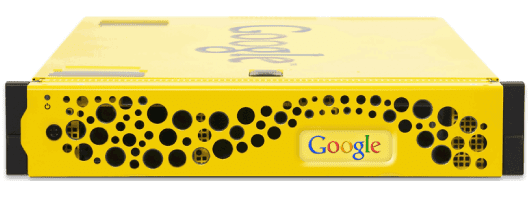Google Search Appliance’s End of Life – End of an Era

As search practitioners, we have always admired Google and all the work they’ve done to redefine and advance the search paradigm. Going beyond basic results retrieval, Google has transformed our expectations when it comes to the data experience. The most frequent complaint we hear from customers as it pertains to their data-driven applications is that apps should behave more Google-like. In some instances, this means basic natural language search across data in sources like relational databases. In other instances, the results that users get returned need higher relevancy and rarely provide a personal, contextual, or even useful experience.
Google Search Appliance launched in 2002 and brought the seamless delivery of natural language search to organizations looking to provide access to all of their data – to both employees or customers. These slick yellow boxes were easy to deploy and offered immediate results. While this solution was a quick win for those looking to solve department-level needs or basic website search, it did not provide actual Google-quality search compared to what we see on google.com every day. GSA left much to be desired in terms of the ability to fine-tune the relevancy experiences based on an organization’s unique needs and mix of data sources. These boxes also became cumbersome when it came to scaling. Our customers would typically look to migrate off GSA when their relevancy needs reached a certain critical mass or the need to scale to multiple search applications throughout the organizations became an imperative.
As Google pushes their enterprise focus into the cloud, they have announced the end-of-life of GSA leaving many customers in a lurch. While no actual alternative or replacement has been announced, their intentions to migrate GSA customers to the cloud have been made crystal clear. This announcement has created a forcing function for many organizations to re-evaluate their search needs going forward. Many companies have already chosen Lucidworks Fusion as the next step in their search journey as they outgrew the capabilities of GSA.
Here are a few of the main reasons companies have made the switch from Google Search Appliance to Lucidworks Fusion:
Higher Relevancy
Relevancy is one of the most critical factors in creating a productive and happy user experience. We are no longer compelled to rifle through results or even scroll down. Subject matter experts have to have capabilities to fine-tune the search experience based on their expertise or user behavior. These SMEs are often non-technical and need relevancy tools that are useful and easy to understand.
Fusion puts relevancy firmly in the control of the application owner with a rich UI for tuning result relevancy and the configuring and enforcement of business rules. Advanced relevancy tools enable admins to calibrate fine-grained relevancy tuning and inspection. Pipeline setup and management enables you to conduct relevancy experiments for comparing, analyzing, and optimizing outcomes.
To advance this concept a step further, Fusion’s signal processing capability captures and aggregates user behaviors and other signals (likes, reviews, credentials etc.) to automatically and dynamically rank results. This same facility can proactively deliver recommendations to users based on their personal preferences, location, and past activity. Developers can go beyond the cumbersome nature of rules management and deliver a more intelligent and powerful data experience.
Data Independence
Apache Solr is the leader in open source search with thousands of deployments across the Fortune 1000. While interest in open source search is high, engineering orgs struggle with building and maintaining the functionality to deliver search apps that run on-top of the open source stack and then also can handle the speed and complexity the business demands. The attraction to open source stems from the desire organizations have to store data independently of a vendor’s solution.
Fusion has all of the advanced feature set and capabilities needed to develop and deploy rich search-driven applications. These features run directly on-top of open source Apache Solr where the data is stored. Users have complete access and control over the data store so applications can take advantage of all the benefits of open source search while reducing the time to market and increasing value of a commercial search solution.
Cost Effective at Scale
In addition to the cost and overhead of maintaining the physical boxes, Google Search Appliance is priced by the number of documents in your collections. So as the amount of data and documents grows, so do your licensing costs.
We decided to price Fusion per node so you can scale to billions of documents while containing costs and reducing your hardware footprint. This allows organization’s to scale applications without the threat of uncontrollable hardware and maintenance costs. Leveraging Apache Solr keeps our focus on developing rich features and functionality for your developers – not punishing you for pushing the limits of search throughout your organization.
Wherever you are in your search journey we encourage you to think about your users first. Data experience is the new user experience and with Lucidworks Fusion you can deliver the most powerful search-driven applications every time.
Interested in talking to one of our GSA Migration Specialists? Contact us today or download Fusion.
Best of the Month. Straight to Your Inbox!
Dive into the best content with our monthly Roundup Newsletter!
Each month, we handpick the top stories, insights, and updates to keep you in the know.